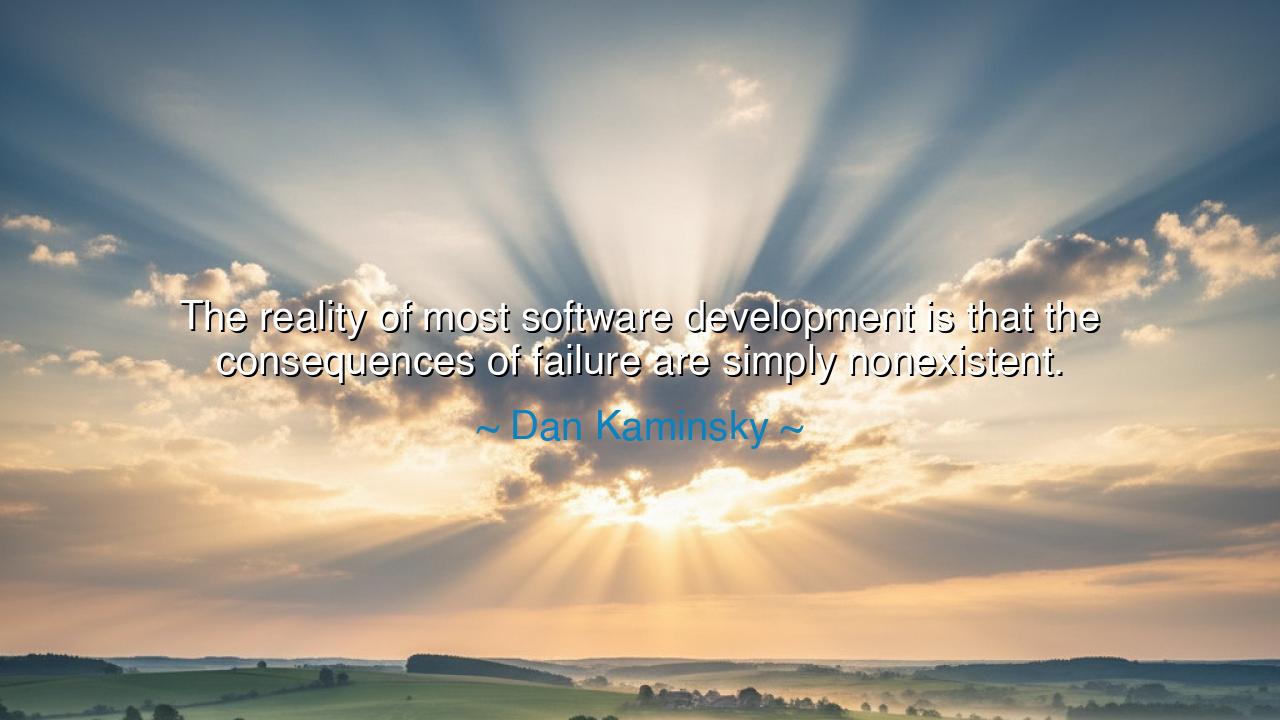
The reality of most software development is that the consequences
The reality of most software development is that the consequences of failure are simply nonexistent.






Host: The room is calm, the soft glow of the lamp casting shadows on the walls as the evening settles in. Outside, the world is quiet, the soft hum of the city barely noticeable. Jeeny sits at the desk, a cup of tea in front of her, her mind clearly focused on something deeper. Jack is pacing by the window, his hands tucked into his pockets, lost in thought. The air between them feels heavy, like a topic is just about to be uncovered.
Jeeny: “I read something today that made me think, Jack,” she says, her voice soft, drawing his attention. “It’s a quote from Dan Kaminsky. He said, ‘The reality of most software development is that the consequences of failure are simply nonexistent.’ What do you think of that?”
Jack: He turns to face her, his brow furrowing slightly. “Failure in software development doesn’t have consequences? That’s an interesting claim. I get that things can be fixed or patched easily, but isn’t there always some kind of consequence when something breaks — even in the digital world?”
Jeeny: “I think what Kaminsky is saying is that, in the grand scheme of things, the consequences of failure in software are rarely as drastic as they might be in other fields. If a program crashes or a system goes down, there are fixes. Most of the time, it doesn’t affect the real world in the same way, like, say, a failed surgery would. Software failures are often temporary, and the consequences can be patched up quickly.”
Host: The light in the room softens, and the conversation begins to deepen. The idea of failure in the context of software development contrasts sharply with failure in other areas of life, where the consequences can feel much heavier. Jeeny’s words seem to shift the focus from the perceived weight of failure to the temporary nature of it in the digital world.
Jack: “That’s true. It’s not like when a piece of software fails, the world ends. You can often just reboot or fix it. But still, there are costs involved. Downtime, lost time, possibly lost data. Even if you can fix it, isn’t there still something to be learned from those failures?”
Jeeny: “Of course. There are always lessons in failure. But Kaminsky’s point is that the immediate consequences aren’t as catastrophic as they might be in other areas. Software failures tend to be more about iteration and adjustment. You try, you fail, you fix it, and you move on. There’s an inherent safety in that process that doesn’t exist in things like healthcare or manufacturing.”
Host: The room seems to hold a quiet tension now, as though both of them are contemplating the broader idea that failure, while always present, takes on different forms in different fields. The digital world is filled with quick fixes and updates, while other areas of life don’t offer such immediate solutions. Jeeny’s perspective on software failure feels almost liberating, like the stakes are lower, the path forward clearer.
Jack: “I see what you mean. It’s almost like in software, failure isn’t something to fear as much as it is something to learn from. It’s part of the development cycle — you don’t have to get everything right the first time. You just need to keep improving.”
Jeeny: “Exactly. The iterative process of software development is one of the reasons the consequences of failure are less severe. It’s about constantly adjusting, tweaking, and evolving the product. Failure doesn’t mean the end of the road; it’s just another step on the way to a better solution.”
Host: The room is quiet for a moment, the weight of failure and its consequences hanging in the air. The digital world, it seems, offers a kind of flexibility that other fields don’t. The ability to learn from mistakes and correct them quickly creates a unique space where failure is just part of the process. For Jeeny and Jack, the idea of failure in software feels almost freeing — a reminder that even when things don’t go as planned, there’s always an opportunity to improve.
Jack: “Maybe that’s what we’re all looking for — that ability to learn from our failures without the pressure of it being something permanent. In some ways, software shows us that failure doesn’t have to be catastrophic; it can just be another part of the path forward.”
Jeeny: “Exactly. In the world of software, failure doesn’t close doors; it opens new possibilities. And that’s a powerful way to look at life as well — where the consequences of failure are just opportunities for growth.”
Host: The conversation drifts into a comfortable silence as the rain begins to softly tap against the window. Jack and Jeeny sit in the quiet, each reflecting on the nature of failure, its consequences, and its role in the process of growth and improvement. In the world of software development, failure is not the end, but the beginning of something better — a lesson that extends beyond the digital world into the way we approach challenges in our own lives.






AAdministratorAdministrator
Welcome, honored guests. Please leave a comment, we will respond soon